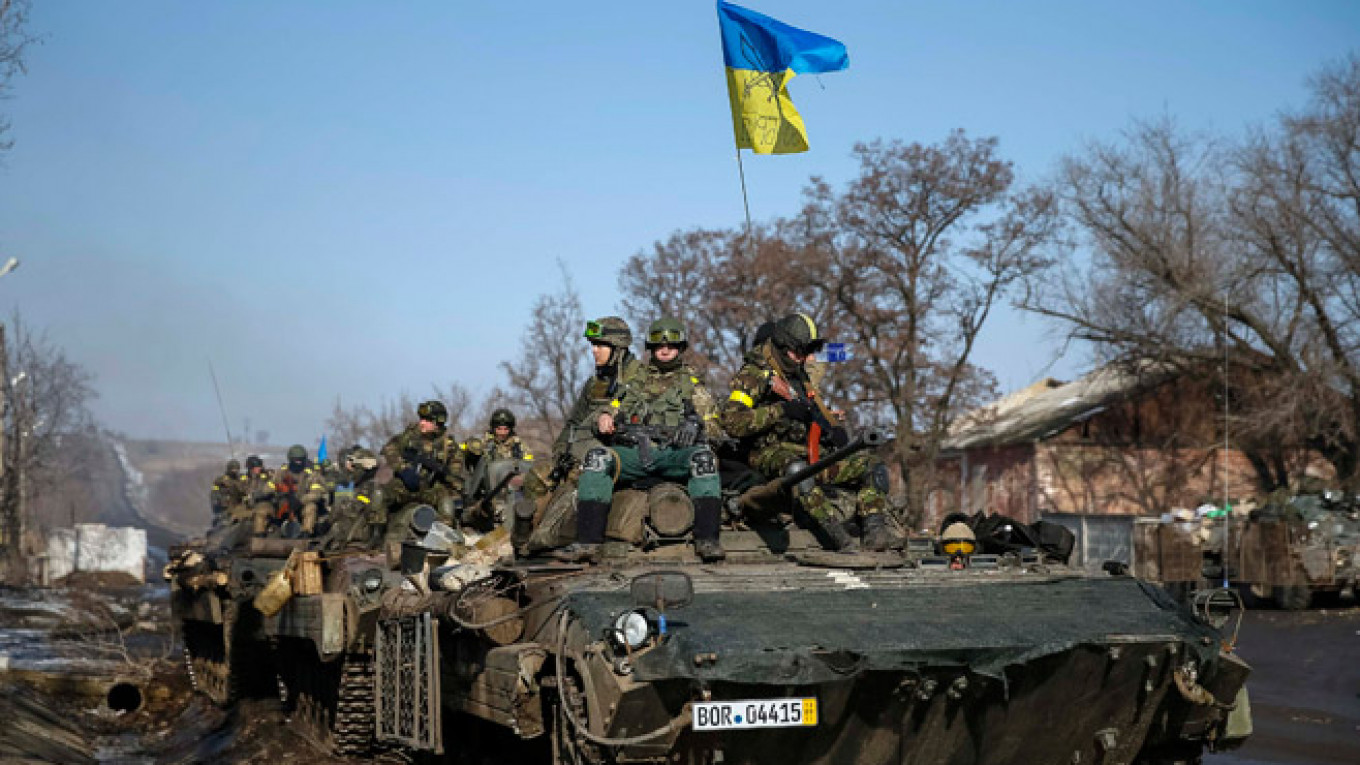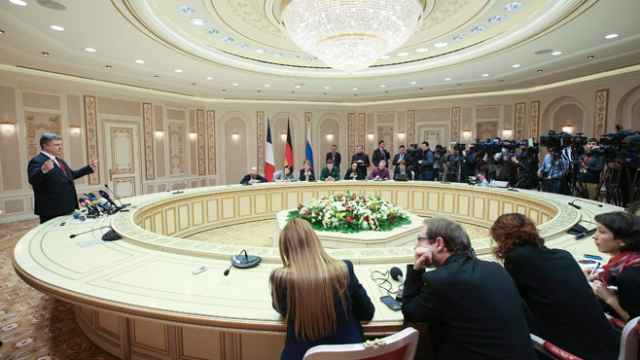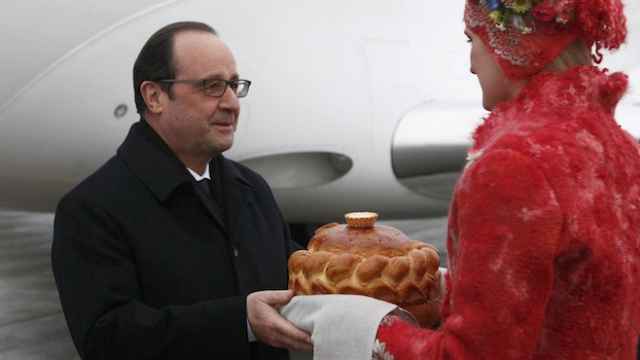The 16-hour marathon of overnight talks between the leaders of Ukraine, Russia, Germany and France resulted in an agreement to end fighting in Ukraine, but stopped short of offering a long-lasting and fundamental solution to a conflict that has already claimed at least 5,300 lives since April.
"It was not the best night of my life," President Vladimir Putin told journalists once out of the negotiation room on Thursday morning.
"But it's a good morning because despite all the difficulties of the negotiation process, we have managed to agree on the main issues," he said.
Under the agreement, a cease-fire is due to go into effect Sunday between pro-Russian rebels and Kiev-controlled forces, followed by the withdrawal of heavy artillery. Both sides will have to withdraw their heavy weapons an equal distance to create a secure zone up to 140 kilometers wide.
For the government forces, the point of measurement is set at the current frontline, while the insurgents will measure the movement of arms from the demarcation line established by the Minsk memorandum signed last September.
The Ukrainian government will only regain full control of its border after a "comprehensive political settlement" that will involve "constitutional reform" implemented by the end of 2015, according to the text of the package of measures for the implementation of the Minsk agreements.
The package was signed by a representative of the Organization for Security and Cooperation in Europe, former Ukrainian President Leonid Kuchma, Russia's Ambassador to Ukraine Mikhail Zurabov and the respective leaders of the self-proclaimed Donetsk and Luhansk people's republics, Alexander Zakharchenko and Igor Plotnitsky.
Both Zakharchenko and Plotnitsky were listed as private individuals in the document, with no title given to them.
Neither Putin nor any of his counterparts from Germany, Ukraine or France signed any document, but they issued a joint declaration endorsing the package and reaffirming their "full respect for the sovereignty and territorial integrity of Ukraine."
The United States, whose government is pondering whether to send lethal defensive weapons to help the Ukrainian army defend the country's sovereignty, was not included in the talks.
"It is striking to see no participation of the U.S. in this at all," said Judy Dempsey, senior associate at the Carnegie Europe think tank, in a conference call with journalists Thursday.
The Minsk talks represent the second attempt to solve the crisis diplomatically in the Belarussian capital. The first Minsk accords, signed in September, failed to produce a lasting cease-fire, and fighting intensified dramatically in January.
Will It Work?
While an end to the fighting is undoubtedly a positive development, above all for the people currently living in a war zone, the chances are slim that Thursday's agreement will pave the way for a long-term settlement, pundits agreed.
"I doubt that Poroshenko will be able to fulfill the provisions of this agreement, especially the constitutional reform," Vladimir Yevseyev, director of the Center of Social and Political Sciences in Moscow, said in a phone interview.
"This agreement will prove very controversial for Ukraine's domestic politics and will be a subject of fierce debate in Kiev," said Eugene Rumer, director of the Russia and Eurasia program at the Carnegie Endowment for International Peace.
While the accord stipulated constitutional reform for Ukraine and special status for "separate parts of the Donetsk and Luhansk regions," Poroshenko said that despite pressure, the Ukrainian side had not agreed to grant autonomy to them.
"Broadening the powers of the Ukrainian regions will take place solely under the constitutional amendments on decentralization. We didn't yield to any compromise on federalization," Poroshenko was cited as saying in a statement published on his website Thursday.
Frozen Conflict?
Dmitry Trenin, director of the Moscow Carnegie Center, saw the agreement as paving the way for another frozen conflict in the post-Soviet space.
"I don't see the Donbass area being integrated back into Ukraine and I don't see [control of] the border with Russia being returned to the Ukrainian government," he told journalists in a conference call.
"What I see is something between Transdnestr [a breakaway state of Moldova since the early 1990s that hosts Russian troops] and Nagorno-Karabakh," he said, referring to the landlocked unrecognized state in the South Caucasus over which Azerbaijan and Armenia fought a war that ended via Russian mediation in 1994.
If heavy artillery is pulled back to create a buffer zone up to 140 kilometers wide, the main rebel-controlled urban centers will be safe from shelling. According to Yevseyev, this will allow those regions to return to normal economic conditions, albeit under the rebels.
"The Ukrainian artillery will practically have to pull back to the neighboring regions, which will allow the rebels to firmly establish their own states," he said.
In the best-case scenario, the cease-fire will last until summer, Yevseyev said.
"It's hard to see which is the most problematic area of this agreement. They all are," said Rumer.
Contact the author at [email protected]
A Message from The Moscow Times:
Dear readers,
We are facing unprecedented challenges. Russia's Prosecutor General's Office has designated The Moscow Times as an "undesirable" organization, criminalizing our work and putting our staff at risk of prosecution. This follows our earlier unjust labeling as a "foreign agent."
These actions are direct attempts to silence independent journalism in Russia. The authorities claim our work "discredits the decisions of the Russian leadership." We see things differently: we strive to provide accurate, unbiased reporting on Russia.
We, the journalists of The Moscow Times, refuse to be silenced. But to continue our work, we need your help.
Your support, no matter how small, makes a world of difference. If you can, please support us monthly starting from just $2. It's quick to set up, and every contribution makes a significant impact.
By supporting The Moscow Times, you're defending open, independent journalism in the face of repression. Thank you for standing with us.
Remind me later.






